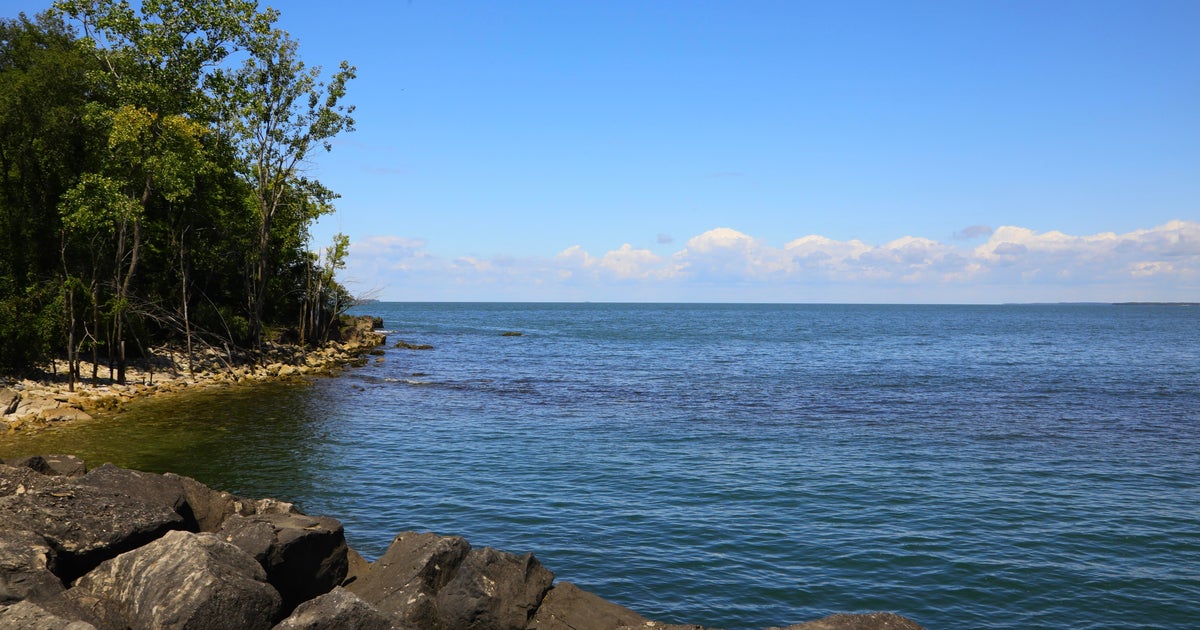China Trade War Hits Keys Lobster Fishermen
Follow CBSMIAMI.COM: Facebook | Twitter
MIAMI (CBSMiami) - On a commercial fishing dock outside of Marathon, a television sat atop a makeshift table allowing a small crew of workers to watch the latest World Cup soccer match while repairing lobster traps and painting buoys.
With lobster season a few weeks away, thousands of traps were waiting to be loaded on boats and dropped in the waters up and down the Florida Keys.
"Gooooooal!," the play-by-play announcer suddenly blared in Spanish, as Sweden scored the second of three goals on Mexico. The largely Mexican crew stared at the television in disbelief.
Boat captain Gary Nichols wasn't paying much attention to the game. He was trying to cope with another world event – the growing U.S. trade war with China.
"It's starting to get a little scary," said Nichols, a commercial fisherman in the Keys for more than 30 years.
On Friday, the United States imposed $34 billion in tariffs on a variety of Chinese products, including computers, dishwashers and medical devices.
In return, China immediately fired back with $34 billion in tariffs on U.S. goods, such as pork, poultry, soybeans, and corn. And tucked into the list of 545 products getting slapped with a 25 percent tariff by China were Florida lobsters.
"I was really praying that wasn't going to occur," Nichols said. "And at this moment I don't know what is going to happen, we're all just in limbo."
Nine years ago, when the price for lobster dropped to $3 a pound, Nichols nearly lost everything. Then along came the China, whose growing economy and burgeoning middle class developed an insatiable taste for the Spiny lobster. Nichols was one of the first to figure out how to ship live lobsters to China and it helped save the commercial fishing industry in the Keys.
"We've been very fortunate over the last several years with the Chinese market," he said.
At its height, lobster prices hit $24 a pound. In recent years it has settled in to an average price of about $10. But now the trade war threatens everything.
To stay competitive, Florida lobstermen are going to have to drop their prices otherwise buyers in China may turn to other markets, including Australia, Brazil and Nicaragua – none of which will have the added 25 percent cost.
"If we go back down without this Chinese market we're looking at a lobster price that is down in that $5-$6 range which just doesn't pay the bills," he said. "With the fuel costs increasing, labor costs increasing, and running these businesses, it's going to be a real struggle; especially coming off a hurricane season where we lost a million dollars. It is going to take years to rebuild after the storm."
Nichols isn't alone in his concerns.
"I'm just hoping our president can resolve this little trade war he's got going with Europe and China," said Jeff Cramer, commercial fisherman who also operates a fish house in Marathon buying lobster from as many as 20 different boat captains.
"A lot of us voted for [Trump] and maybe this will work out in the long run but for the short term it's really going to devastate us after we had that hurricane last year." He said. "A lot of guys are living off the SBA loans that they have to start paying back in a little bit."
Cramer said he is taking a wait and see attitude regarding the President.
"Let's see what happens," Cramer said. "He got Rocket Man to back down, let's see if he can get the Chinese president to back down."
Nichols also voted for Trump and is standing by him.
"I think he's doing a good job," Nichols said. "He's a smart man, he's a lot smarter than I am. And he's a businessman that makes a lot of money."
He said he hopes Trump understand the impact on "little guys, like ourselves, with little family businesses."
"I even thought about writing him a letter," Nichols added, "and get him to see who's affected."
Both Nichols and Cramer said they understand why the President is engaging in this fight.
"It might be a hit here short term, but maybe in the long term, you know, maybe it will give us a helping hand because we've been at a disadvantage," he said.
Even before the tariff, lobster shipped from the United States to China was hit with 17 percent in taxes and duties, according to Larry Yee, one of several brokers who buy lobster in the United States and then sell it to eager buyers in China.
"Why 17 percent?" Yee asked. "We shouldn't pay that at all."
As part of his business, Yee also imports fish and crabs from China to the United States.
"There are no taxes here, no import taxes, no duty, no nothing," Yee said. "But for our goods to go into China, yes there are taxes, there's duty and now tariff. It's insane."
CBS4 News spoke to spoke to Yee as he was on his way to China to renegotiate his prices with his distributors and buyers to keep the Florida market in China from collapsing.
One possible outcome of the tariff is that Florida restaurants, who often have trouble getting Florida lobsters because so much of it has been shipped to China, will now be able to place it on their menus again. But even that is not guaranteed. After losing out to China, many local buyers have gotten used to buying cheaper, frozen lobster from the Caribbean and Latin America.
Nichols said he if he could get a good price domestically for his lobster, it will take time to develop that business again.
"We have to kind of re-invent the wheel," Nichols said. "We have to go back to square one and go back to the marketing. And it doesn't happen overnight. Sometimes it takes a year or two to get that going."
Yee, who was born in China and is a U.S. citizen, said he supports President Trump's decision but admits to being a little nervous. Nevertheless, he hopes in the long run, it will all work out.
"Everybody's just has to come together in this industry to get this thing over with," he said. "Once it gets through we'll have a better day. And then we can really compete with all the other countries."
In the meantime, Nichols never thought his family's fate could be tied to the outcome of a global trade war. It's taught him a valuable lesson.
"Sooner or later it does trickle down to the little guy and we are the little guys," he said. "But we support this country. But maybe we all need to back down, take some tax off and let's do business."
THE FOLLOWING ARE STATEMENTS BY LOCAL MEMBERS OF CONGRESS & GOV. RICK SCOTT REGARDING THE TRADE WAR AND ITS IMPACT ON LOBSTER INDUSTRY
SENATOR MARCO RUBIO:
"I support the President in confronting China on its illegal and unfair trade practices. This effort would be even more effective if we had joined forces with our allies in Europe, Asia, and North America to confront China, instead of imposing tariffs on them as well. The best way to address whichever retaliatory tariffs China decides to impose would be to open up alternative markets for impacted industries. Florida's lobstermen harvest a world-class product, and if the Chinese impose tariffs on them, other countries will benefit from access to our lobster. In addition, I remain focused on delivering disaster relief for the Florida Keys, including the recent fisheries disaster funding allocation for Florida fishermen and lobstermen."
JOANNA RODRIGUEZ, SPOKESWOMAN FOR REP. CARLOS CURBELO:
"The Congressman is extremely disappointed by the new tariffs against Florida lobster, especially given they were a foreseeable side effect of a poorly executed attempt to hold trade partners accountable. While he does believe the United States should demand fair practices from our trade partners, he has never felt the President's tariff policy was the right way to do so. As he stated back in March when this situation began escalating, unless the tariff policy is further refined and targeted to counter abusive trade practices by bad actors, it will end up punishing the American people and job creators. Representative Curbelo has seen and heard firsthand how the Florida Keys lobster industry has struggled since Hurricane Irma. Adding this tariff to the already existing challenges has the potential to be catastrophic for the industry and the families that depend on it for a living. Whether it's the concerns of South Dade agriculture regarding NAFTA or the concerns of Keys fishermen regarding these new tariffs or the steel tariffs negatively affecting boating manufacturers, Representative Curbelo has and will continue to highlight the real-life examples of how the Administration's trade policies are hurting the local and national economy, and urge them to end the policy and sit at the negotiating table with our trade partners to swiftly find a solution that benefits American workers and businesses."
FLORIDA GOV. RICK SCOTT:
"I have heard directly from Florida companies who are worried that the Administration's proposal regarding tariffs is not fair and consistent between countries and this is an issue I will continue discussing with the Administration to ensure Florida companies are treated fairly. I support free and open trade with the world because it is good for Florida and our economy. The reality is that as long as other countries levy tariffs on U.S. produced goods, we must also have the ability to do the same to ensure fairness to American companies and workers. The real, long term solution to these issues is to reduce our regulatory and tax burden in order to better compete with the global market and employ all tools at our disposal to make sure we're protecting the interests of the U.S. economy."







